Ukraine
Before we get to today’s main topic, I feel compelled to talk about the war in Ukraine, which so greatly affects the Holy Orthodox Church.
 First and most important, please give to aid the suffering Ukrainian people.
First and most important, please give to aid the suffering Ukrainian people.
I recommend International Orthodox Christian Charities: https://iocc.org IOCC has contacts inside Orthodox countries, which means they get help to people quicker than many other agencies. “Charity Navigator” says IOCC is transparent and efficient, and we can give to them with confidence: https://www.charitynavigator.org/ein/251679348
Now, here are some comments about the Ukrainian cataclysm and how it involves the Orthodox Church.
1 Russia and Ukraine are both predominantly Orthodox countries. 77% of the Russian population and 67% of the Ukrainian population are Orthodox.

Reuters/Mikhail Metzel
2 The president of the Russian Federation has prominently displayed his Orthodoxy. In searching, I found literally dozens of pictures of Mr Putin lighting candles, and of him standing with the Patriarch. His visits to Mount Athos were covered extensively.
3 The present war is closely connected with Orthodoxy. Both Russians and Ukrainians have their Orthodox roots in Ukraine, where Saint Vladimir and the ‘Rus became Orthodox Christians. Later the ‘Rus moved north, and after that it gets very complicated.
4 Ukraine was part of the old Russian Empire. Then it was one of the Union of Soviet Socialist Republics. However, during those times Ukraine preserved its own distinct language and identity. After the USSR breakup in 1989, Ukraine became an independent country. For complicated reasons, a large minority of the population of Ukraine are of Russian ethnic background. Polls taken in recent times suggest that even many of them now have a strong Ukrainian identity.
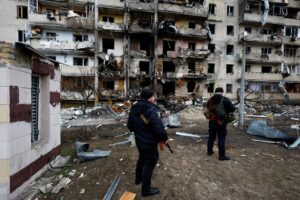
Umit Bektas/Reuters
5 Should Ukraine now remain independent or again become part of the Russian Empire? The Orthodox president of Russia has decided to answer that question by attacking and invading Ukraine, trying to force them to become Russian. Mr Putin and the Russian armed forces have intentionally targeted civilian areas, killing many innocent people, and creating thus far over a million refugees.

Mr Putin is trying to terrify Ukraine into submission – and this, just as Orthodox Christians enter into the holiest seasons of the year. We are not allowed to judge people, but we can judge actions. This is despicable, barbaric, shameful. It is something we might have expected from an atheist dictator. However Kirill, Patriarch of Moscow and All ‘Rus, has indirectly (to put the best possible reading on it) supported the war. This will stain the Russian Orthodox Church for a long time to come.
6 Follow closely now – and if I have any facts wrong, will someone please correct me. Orthodoxy in Ukraine is divided between two competing jurisdictions. One, under Metropolitan Onuphry, is attached to the Patriarch of Moscow. The other, under Metropolitan Epiphanius, has existed since Ukraine gained its independence, and was formally recognized and granted autocephaly (ecclesiastical independence) in 2019 by the Ecumenical Patriarch of Constantinople – over strong objection by the Patriarch of Moscow and quieter dissent from some others who believed he had no right to do that. (It’s important to remember that in the Orthodox Church things just sort of “happen” and get worked out over the centuries.)
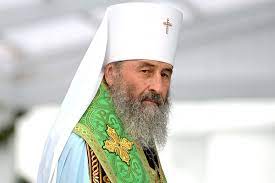 Metropolitan Onuphry (from capital,ua.)
Metropolitan Onuphry (from capital,ua.)
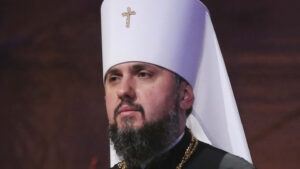 Metropolitan Epiphanius (from Sydney Morning Herald)
Metropolitan Epiphanius (from Sydney Morning Herald)
Both Ukrainian Metropolitans have condemned the war. On February 24 Onuphry, Metropolitan of the Russian Orthodox Church in Ukraine, (rather taking his life in his own hands) stated: “The Ukrainian and Russian peoples came out of the Dnieper Baptismal font, and the war between these peoples is a repetition of the sin of Cain, who killed his own brother out of envy. Such a war has no justification either from God or from people.” Two bishops of the Russian Orthodox Ukrainian Church have directed their priests to no longer commemorate Patriarch Kirill at Liturgy!
Certainly, one intention of the war is to incorporate the Autocephalous Church of Ukraine into the Moscow Patriarchate.
7 This situation affects the entire Orthodox Church. In 2019 Patriarch Kirill of Moscow formally broke Eucharistic communion with Ecumenical Patriarch Bartholomew. For theological reasons? No. We all share the same Faith. The schism (sadly and wrongly, I believe) was merely for political and jurisdictional reasons. It has resulted in many Orthodox patriarchs and metropolitans in the world “taking sides”.

Ecumenical Patriarch Bartholomew
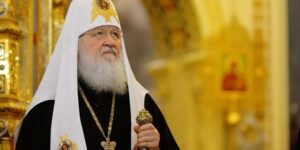
Russian Patriarch Kirill
Which side is correct? Here is a quote from John Sanidopoulos’ excellent Blog: https://www.johnsanidopoulos.com/2021/12/the-future-of-mystagogy-resource-center.html
“If you were to ask this question to Patriarch Bartholomew, he would say there is no schism with the Russian Church, because he commemorates the Russian Primate in every Divine Liturgy. If you asked Metropolitan Epiphanius of Kiev the same question, he would tell you there is no schism, because he commemorates the Russian Primate in every Divine Liturgy. If you asked the question of any Bishop around the world in communion with the Ecumenical Patriarchate, they would answer in a similar way. However, if you asked Patriarch Kirill of Moscow, he would say that Patriarch Bartholomew is responsible for the schism, which is why he does not commemorate him in the Divine Liturgy as well as the Hierarchs of at least four Autocephalous Churches that are in disagreement with the Primate of Russia (all four of which continue to commemorate the Primate of Russia). Therefore, if a schism only exists when you view it from the Russian perspective, and no schism exists from the perspective of the Ecumenical Patriarchate, then the conclusion should logically be that the Primate of Russia is responsible for the schism.”
8 Now that the Patriarch of Moscow supports the Ukrainian war and the Ecumenical Patriarch has bitterly condemned it, many Orthodox patriarchs and other Orthodox authorities have taken sides again. A few support the Russian invasion. Others condemn it. Most have spoken about it only in very general terms – which, in light of what is going on in Ukraine, is woefully inadequate, I believe. I fear this will divide and haunt and greatly damage the Holy Orthodox Church and her work for many years to come.
Here is the best description I have seen of the present situation: https://www.commonwealmagazine.org/orthodox-response-putin-invasion
Here, if you’re interested, is one of the last independent news outlets still coming out of Russia. Read it while you can. Others are quickly being silenced. https://www.themoscowtimes.com
Pray, brothers and sisters, pray.
.
The Last Sunday of Pre-Lent
As you can see from the title far above, there’s a lot going on this Sunday.
Epistle for the Last Sunday of Pre-Lent: Romans 13:11-14,14:1-4.
Point One:
“Brethren, salvation is nearer to us now than when we first believed.” No doubt about that! Time is passing. We don’t have forever to shape up.
How much time any of us have left on earth we do not know. It could be very short. Therefore, whatever you need to change, do it now. Saint Paul uses day/night winter/spring imagery. The darkness of winter is fading, the light of spring is at hand.

courtesy of Saint Basil Greek Orthodox Church, San Jose, CA
In our hymns next Monday we will sing: “The Lenten spring has come!” Well, up here in Wisconsin, not quite yet! but we do have a few bulbs peeking out now (to their dismay), so we know spring is coming.
- Any readers here from the southern hemisphere? How do you handle the Church’s liturgical imagery down there where the seasons are reversed?
Likewise (despite current evidence, God help us all), the world’s darkness is fading. The springtime of God’s Kingdom is at hand: the Light of Pascha which “shall never be overtaken by night”, followed by the bright summer of Pentecost.
Therefore, says Saint Paul, put aside all the junk you’re ashamed to have seen in the light: reveling, drunkenness, debauchery, quarreling, jealousy. Go for what is good. Come into the light of the Kingdom.
Point Two:
“Let not him who eats despise him who abstains, let not him who abstains pass judgement on him who eats.”
Some Orthodox keep a strict Fast. Some do not. Why? None of your business. That’s between them and God.
 olympianfoods.com.au
olympianfoods.com.au
Why should we not should judge each other’s fasting? Because as Paul writes: “God has welcomed him. Who are you to pass judgment on the servant of another?” I think this means: If that person is still welcome to receive the Holy Eucharist and priest says “The servant of God N. partakes of the Body and Blood of Christ”. A person can be excommunicated by the Church for adultery, but not for not fasting. So… none of your business.
Sunday’s Gospel reading continues this theme.
Holy Gospel for the Last Sunday of Pre-Lent: Matthew 6:14-21
“And when you fast, do not look dismal, like the hypocrites, for they disfigure their faces that their fasting may be seen by men. Truly, I say to you, they have received their reward. But when you fast, anoint your head 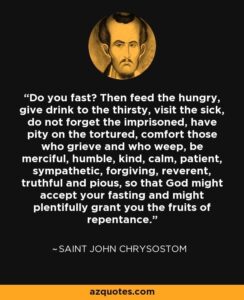 and wash your face, that your fasting may not be seen by men but by your Father who is in secret; and your Father who sees in secret will reward you.”
and wash your face, that your fasting may not be seen by men but by your Father who is in secret; and your Father who sees in secret will reward you.”
The purpose of the Fast is for you to work on you, not for you to impress other people, not for you to judge other people.
My first Lent in Episcopalian seminary I made a strict rule. I would fast and pray diligently. However I, being young and foolish, spent much time checking out the people around me: Why are some of them not fasting and worshiping as wonderfully as I am? Answer: Perhaps they were doing so in private, in their “closet”, as Jesus directed, so as not to call attention to themselves. Or maybe they weren’t. Whichever, it was none of my business. By the end of that Lent I had kept my very strict rule, and I was filled with the spirit of judgment and pride, and I was worse off than when Lent began.
During Lent, mind your own business.
Point Two
Going back to the first verses of the Gospel: “If you forgive men their trespasses, your heavenly Father also will forgive you; but if you do not forgive men their trespasses, neither will your Father forgive your trespasses.”
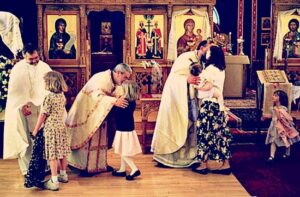 orthochristian.com
orthochristian.com
This why today is called Forgiveness Sunday. In many churches today (I think an increasing number – including yours, I hope) Forgiveness Vespers is celebrated. This the first service of Great Lent. At the end, all come forward and, one by one, ask each other’s forgiveness: “Forgive me a sinner, forgive me a sinner.” In some churches the formal response is “God will forgive you, and I forgive you.” In many churches, there is also a lot of hugging, and many moist eyes.
Western Ash Wednesday is individualistic *, very solemn, as people receive ashes on their foreheads and are told “Remember that you are dust and to dust you will return”. That’s the truth. It’s a good reminder as people enter Lent. But our Orthodox Forgiveness Vespers is communal, filled with love and mercy. It’s sweet. I think it’s an even better way to begin Lent.
- So individualistic that some churches now offer drive-by “ashing”, so that people needn’t even attend a worship service. But “driving thru” the ashes? That must save even more time!

parkerumc.org
(Sometime I must tell you about the drive-in funeral home. But we’re getting ‘way off the subject, aren’t we?)
To repeat: “If you forgive men their trespasses your heavenly Father will also forgive you, but if you do not forgive men their trespasses neither will your Father forgive your trespasses.” Is that clear enough?
It’s hardly a secret: We pray it every day: “Forgive us our trespasses as we forgive those who trespass against us.” “Lord, if I refuse to forgive, please don’t forgive me. Lord, if I hold a grudge, please hold a grudge against me.” We hear this again and again in the New Testament. Remember the parable of the wicked servant who was forgiven a huge debt by his master, but then refused to forgive his fellow servant a small debt. It says the Master was angry and had him killed. And so, said Jesus, will my heavenly Father do to you if you do not forgive your brothers from your heart.” Matthew 18:21-35
Again, is that clear enough? Our loving God will kill us if we don’t forgive? It refers to our souls, of course. A hard, unforgiving heart is spiritual suicide. It kills our immortal souls.
It is the Orthodox custom, on Forgiveness Sunday, for each of us to ask the forgiveness of all. From our Antiochian Bishop Thomas I learned this practice: He sends out a general email to everybody he knows asking our forgiveness for anything in which he has offended us or hurt us.
But what if the person you’ve offended has died? Tell them anyway. Ask the angels to get the message through.
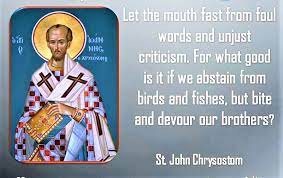 catholicworldnews.com
catholicworldnews.com
So now, before you go into Lent, if there is anyone you should apologize to but have not: Apologize. If you know of a particular person you have offended, say “Forgive me.” Say it.
I’ve heard many Confessions. I’ve done a lot of counseling. I’ve also done a lot of living. I believe that most hurts (not all, but most) are unintentional. People get preoccupied with their own problems or overcome by them, and we just get in the way at the wrong time. Or people mis-speak or mis-act and never notice it. Or perhaps they have weaknesses they can’t overcome. In fact it may well be that the other person thinks you were the one in the wrong – and maybe you were, and you didn’t mean it.
So if there is someone you’re not getting along with, consider: You may have been part of the problem, even if you didn’t intend it, even if you don’t know it. So say it, or if that’s too awkward, at least send an email: “Forgive me, a sinner.”
Also, I believe that sometimes people are sorry but don’t apologize, because they’re afraid if they say it they’ll be rejected, afraid you’ll beat ’em over the head with it or just turn away. “Forgive me.” “No way!”
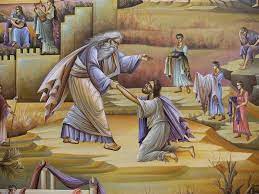 So, remember again the story of prodigal son. 1 Learn from him to be tough on yourself. Be ready to say “forgive me”. 2 Learn from the father to be gentle. Find a way to let people know they will be forgiven.
So, remember again the story of prodigal son. 1 Learn from him to be tough on yourself. Be ready to say “forgive me”. 2 Learn from the father to be gentle. Find a way to let people know they will be forgiven.
orthochristian.com
Now, let’s take some trickier cases.
1 What if the other person just can’t bring himself to say he’s sorry. My father was like that. For some reason (some hurt from his past, I always suspected) he just couldn’t get those words out. It would have helped a lot if he had. However, he would do a multitude of things to show he was sorry. OK, that’s good enough. Accept that as an apology. In response, don’t say “I forgive you”. That’s pretentious. But in your heart, forgive and move on. That will begin to make up for the thousand times you never bothered to tell God you were sorry. Nevertheless He saw into your heart and forgave, and has kept pouring out His blessings on you. Like Him, forgive easily, quickly. I mean, what do we think we are: better than God? God forgives, and we won’t?
2 What if the other person has wronged you (or someone you love) and, no matter what you do, shows no signs of being sorry. In that case the process of forgiveness obviously can’t be completed. Forgiving in its fullness is a two-way street.
However, you must forgive “from your heart”, as Christ commanded. Put it down. Don’t dwell on the hurt. This is very hard to do, believe me. A quick “I’m sorry.” “That’s OK” would be so much easier – get it over with and done. And if the other person won’t do that – well, now you now have something else to be offended by. Double jeopardy! This is very hard.
However, that is all the more reason why you must be ready to lay the matter down. For the danger of spending your life angry at someone, holding a grudge, is this: It will give that unrepentant rat power over you forever, the ability to make you miserable, to corrupt and corrode your inner life, your peace of mind. You’ll often be mouthing prayers, but thinking not about God and His love but rather about how that person did you wrong. And, as I said, in the end it will destroy your soul. The hard heart is a foretaste of Hell, the misery of Hell, and if you don’t let loose of it, finally it will turn into the Real Thing.
At the end of peoples’ Confessions I always ask “Is there anyone you have not forgiven?” Sometimes they say “I thought I did, but I’m not sure, since the hurt keeps coming back, so maybe I didn’t.” I sometimes respond: “Have you hired a hit man to ‘take him out’?” They, startled, say “No!” And I say, “Then the process of forgiving has begun. Just keep doing it.” C S Lewis wrote that when Christ said we must forgive “seventy times seven times”, Matthew 18:21-22 He meant for each sin. Every time the hurt and anger rises again in our heart and minds, we must forgive again, till finally it goes away. Forgiving is a process.
Let me tell you two of my favorite stories about forgiveness.
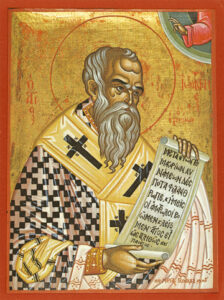
With permission of Saint Isaac’s Skete at skete.com
1 On Sunday in the middle of Divine Liturgy, Saint John the Merciful, Patriarch of Alexandria, remembered that there was a priest in the city who was angry at him. He remembered also the words of our Lord: “If you bring your gift to the altar and there remember that your brother has something against you, leave your gift before the altar and go. First make peace with your brother, and then come and lay your gifts before the altar.” Matthew 5:23-24 So Patriarch John, before the Great Entrance, left the procession (I hope he told the choir to keep singing) and sent for his brother priest, made peace, and only then did he come back to finish the Entrance and place the Holy Gifts on the altar.
2 There was a monk who had led a less than exemplary life, but nevertheless as he lay on his death bed was happy as could be, not worried at all. His fellow monks asked: With the kind of life you’ve led, why aren’t you afraid of dying? The man answered: “Because I have forgiven everyone who ever hurt me, so I know God will have to forgive me.” And he died a happy man.
Point Three
Finally: “Do not lay up for yourself treasures on earth where moth and rust destroy and where thieves break in and steal, but lay up for yourself treasures in heaven where moth and rust do not destroy, where thieves do not break in and steal.”
The purpose of Lent is not to give up some food and some sin for forty days and then go back to them. The purpose of Lent is to get our lives back on track again, get us centered again on what’s really important, get our priorities straight, as they say – so that when the Fast is over, we can do a better job of living right, focused on what’s most important, what will last beyond our few years on earth.
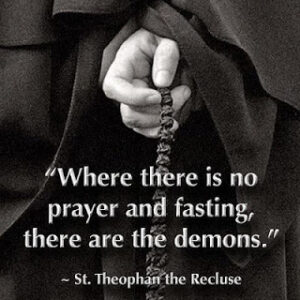 There are only three things you can take with you into Eternity, and your Tesla isn’t one of them. The three things are: God, people and you, your immortal soul.
There are only three things you can take with you into Eternity, and your Tesla isn’t one of them. The three things are: God, people and you, your immortal soul.
During Lent concentrate on God: Pray regularly, morning and evening. Worship more. Give give serious thought to going to Confession.Take advantage of the special beautiful Lenten services the Church offers us.
During Lent concentrate on the people around you, the people you love: your family, your friends, the welfare of your neighbors and the people you work with, the needy. Give more to charity. IOCC.
During Lent concentrate on You. How to do that? If you focus on God and people, try to love God with all your heart, soul, mind and strength, and love your neighbor as yourself, that’s how you will find the true You.
And you will “have treasure in heaven”. In fact, you will discover that God and people and peace in your soul are the great treasures even in this life.
So are you ready? God grant you a blessed, holy, happy Lent.
Father Apostolos Hill: Orthodos Christian Chants: https://www.youtube.com/channel/UC2eQY65jlYsdDuevEUE9CGQ
Next Week: First Sunday of Lent
Week after Next: Second Sunday of Lent
Great, inspiring post. Thank you.
Thank you, Sophia.